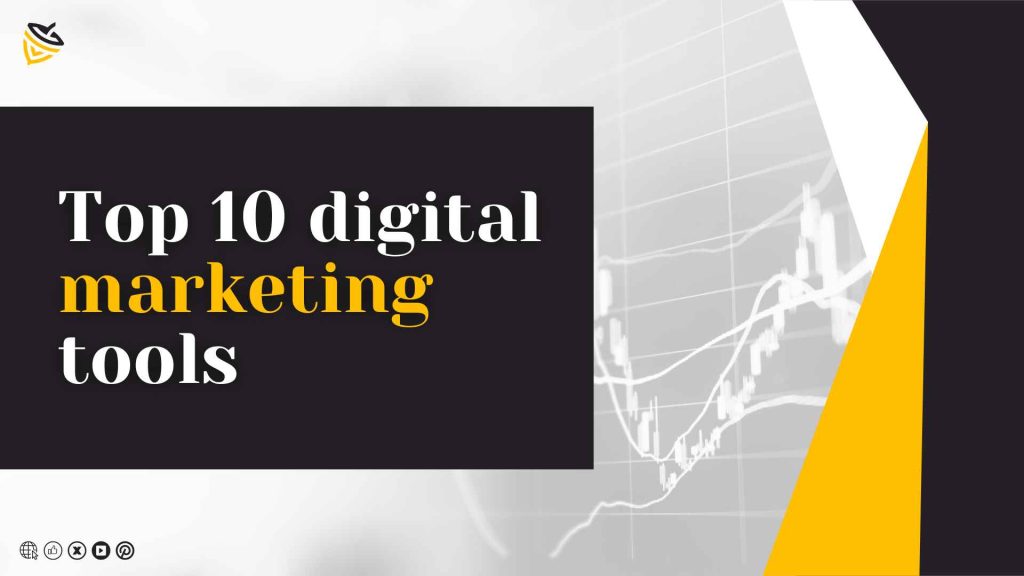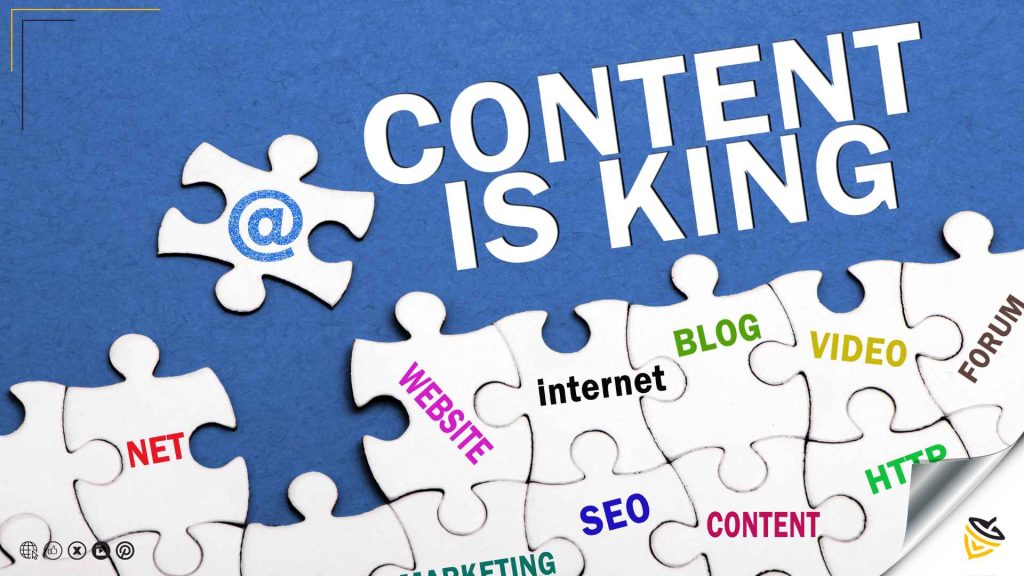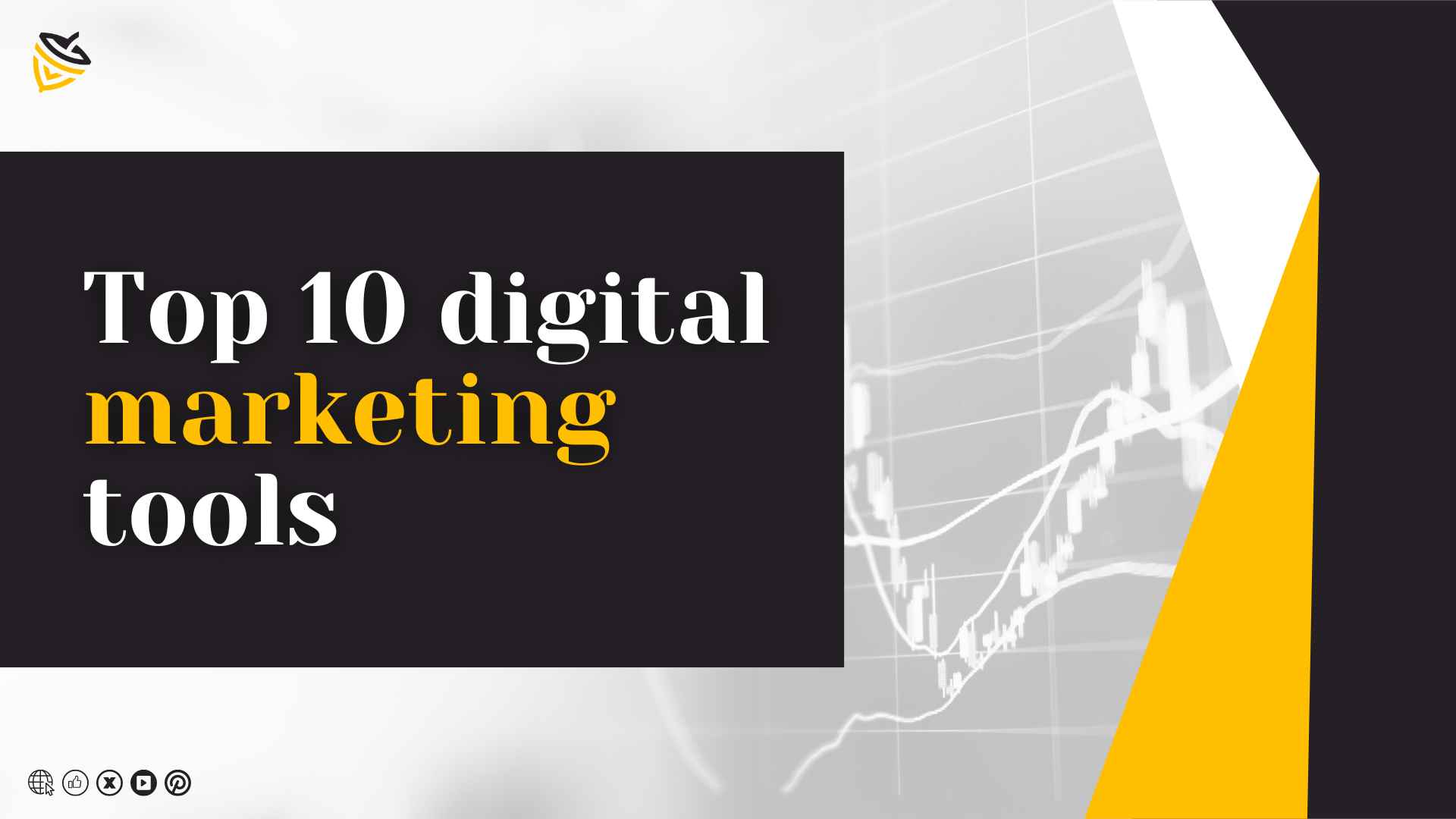
The top 10 digital marketing tools are Google Analytics, SEMrush, Ahrefs, Mailchimp, Hootsuite, Buffer, Canva, HubSpot, Moz, and BuzzSumo. These tools help businesses improve their online presence and marketing strategies. Digital marketing has become essential for businesses aiming to thrive in the online space. The right tools can provide valuable insights, streamline processes, and enhance overall marketing efforts. Google Analytics, for instance, offers in-depth data on website traffic and user behavior.
SEMrush and Ahrefs are excellent for SEO and keyword research. Email marketing platforms like Mailchimp automate and optimize email campaigns. Social media management tools like Hootsuite and Buffer simplify posting and engagement. Canva helps create compelling visuals, while HubSpot offers comprehensive marketing solutions. Moz and BuzzSumo provide additional SEO and content marketing insights, making them indispensable for modern digital marketing.
Introduction to Digital Marketing Tools
Digital marketing tools make it easier to manage and improve online marketing. These tools help in reaching more people and growing your business. They save time and provide valuable insights.
The Importance of Tools in Digital Marketing
Digital marketing tools are essential for success. They help automate tasks and provide data to guide decisions. These tools also help in tracking performance and optimizing strategies.
- Automation: Save time with automated tasks.
- Analytics: Get insights from data.
- Optimization: Improve your strategies with real-time data.
Criteria for Selecting The Right Tools
Choosing the right tools is crucial. Here are some criteria to consider:
| Criteria | Description |
| Ease of Use | Tools should be simple and user-friendly. |
| Cost | Consider your budget before choosing a tool. |
| Features | Look for tools with features that meet your needs. |
| Customer Support | Good support can help solve issues quickly. |
| Integration | Tools should integrate with other systems you use. |
SEO Optimization Tools

Boosting your website’s visibility on search engines is crucial. These SEO optimization tools are essential for achieving that. They help in keyword research, analyzing competition, and improving both on-page and off-page SEO.
Keyword Research and Analysis
Finding the right keywords is the first step in SEO optimization. These tools make it simple:
- Google Keyword Planner: Offers keyword ideas and traffic estimates.
- Ahrefs: Provides comprehensive keyword research and competitor analysis.
- SEMrush: Discover profitable keywords and track rankings.
- Ubersuggest: Free tool for keyword suggestions and search volume.
These tools help in identifying high-traffic keywords. They also provide insights into competition. This makes it easier to strategize and optimize content.
On-page and Off-page SEO Enhancement
Improving on-page SEO involves optimizing elements on your website. Off-page SEO focuses on external factors. Here are tools for both:
| Tool | Function |
| Yoast SEO | On-page SEO plugin for WordPress. |
| Google Search Console | Monitors site performance in search results. |
| Moz | Tracks site rankings and backlinks. |
| BuzzSumo | Analyzes content performance and backlinks. |
Yoast SEO helps optimize content with focus keywords and readability checks. Google Search Console offers insights into your site’s visibility and crawling issues.
For off-page SEO, Moz and BuzzSumo are invaluable. They provide data on backlinks and content performance. This helps in building a strong backlink profile.
Affiliate Marketing Networks
Affiliate marketing networks are crucial for any digital marketing strategy. These networks connect businesses with affiliates who promote their products. This helps increase sales and reach a broader audience. Using the right affiliate marketing networks can make a significant difference in your marketing efforts.
Finding and Partnering with Affiliates
Finding the right affiliates can be challenging. There are many platforms to choose from.
- ShareASale: This platform connects merchants with affiliates. It offers a wide range of products.
- Commission Junction (CJ): CJ is one of the largest affiliate networks. It provides a robust tracking system.
- ClickBank: ClickBank specializes in digital products. It offers high commissions.
- Rakuten Advertising: Rakuten connects retailers with global affiliates. It offers advanced tools for tracking.
- Amazon Associates: Amazon’s affiliate program is user-friendly. It offers a vast range of products.
Once you have chosen a platform, it’s time to partner with affiliates. Look for affiliates who align with your brand. This ensures that your products are promoted effectively.
Monitoring Affiliate Performance
Monitoring affiliate performance is crucial for success. Use analytics tools to track performance.
| Tool | Function |
| Google Analytics | Tracks traffic and conversions from affiliates. |
| Voluum | Offers detailed performance reports. |
| Post Affiliate Pro | Tracks clicks, sales, and commissions. |
Regularly reviewing these metrics helps in optimizing your strategy. Reward top-performing affiliates to motivate them. This can be in the form of higher commissions or bonuses.
Content Marketing Platforms

Content marketing platforms are essential tools for any digital marketer. These platforms help in creating, managing, and distributing content effectively. They also provide insights into how well your content is performing. Let’s dive into the key aspects of content marketing platforms.
Managing and Distributing Content
Managing and distributing content can be a daunting task. This is where content marketing platforms shine. They offer features that simplify content creation and scheduling. With these tools, you can plan your content calendar and ensure timely posts.
Some platforms even allow collaboration among team members. This ensures everyone is on the same page. Tools like HubSpot and CoSchedule are excellent for this purpose. They offer drag-and-drop interfaces to make scheduling easier.
| Platform | Key Feature |
| HubSpot | Drag-and-drop calendar |
| CoSchedule | Team collaboration |
Tracking Engagement and Performance
Tracking engagement and performance is crucial for any content strategy. You need to know how your audience interacts with your content. Content marketing platforms provide analytics tools that track these metrics.
Tools like Google Analytics and BuzzSumo offer detailed insights. They show you which content is performing well and which needs improvement. This data helps in refining your content strategy.
- Google Analytics: Provides detailed traffic and engagement metrics.
- BuzzSumo: Analyzes social shares and content performance.
By using these tools, you can make data-driven decisions. This ensures your content resonates with your audience.
Email Marketing Services
Email marketing services play a crucial role in digital marketing. They help businesses reach their audience directly. With the right tools, you can create, manage, and optimize email campaigns. Let’s explore how to make the most of these services.
Designing Effective Campaigns
Designing an email campaign requires a strategic approach. Start by choosing a responsive email template. Ensure it looks good on all devices. Use eye-catching visuals and clear call-to-actions to engage your audience. Keep your message concise and focused.
Here is a table of top features to include in your email design:
| Feature | Importance |
| Responsive Design | High |
| Clear CTA | High |
| Engaging Visuals | Medium |
| Concise Text | High |
Segmentation and Personalization Strategies
Segmentation helps target the right audience for your campaign. Group your email list by demographics, behaviors, or interests. This ensures your content is relevant to each group.
Personalization goes hand-in-hand with segmentation. Use your subscriber’s name and tailor the content to their preferences. Here are some personalization strategies:
- Use the subscriber’s name in the subject line.
- Send emails based on past purchases.
- Recommend products or content based on browsing history.
Implementing these strategies can boost your open and click-through rates significantly.
Social Media Management Solutions
Social media management solutions have transformed how businesses engage with audiences. These tools save time and amplify your digital marketing strategy. They also provide valuable insights to enhance content performance. Explore the benefits of using these solutions for your business growth.
Scheduling Posts and Engaging Audiences
Scheduling posts helps maintain a consistent online presence. Tools like Hootsuite and Buffer allow you to plan posts. This ensures content goes live at optimal times. You can schedule posts for multiple platforms from one dashboard. This saves time and boosts productivity.
These tools also help in engaging with your audience. Respond to comments and messages promptly. Maintain active conversations with followers. This interaction builds trust and brand loyalty. A consistent and engaging presence can lead to higher user retention.
Analyzing Social Media Insights
Analyzing social media insights is crucial. Tools like Sprout Social and Agorapulse provide detailed analytics. They offer metrics on engagement, reach, and impressions. This data helps you understand what content works best. Adjust your strategy based on these insights.
You can also track your followers’ demographics. Know their age, gender, and location. Tailor your content to meet their preferences. This targeted approach increases engagement and conversion rates. Data-driven decisions lead to better marketing outcomes.
| Tool | Key Feature |
| Hootsuite | Post-scheduling and analytics |
| Buffer | Content planning and engagement |
| Sprout Social | In-depth social media insights |
| Agorapulse | Comprehensive analytics and reporting |
Incorporate these tools into your digital marketing strategy. Benefit from efficient post-scheduling and detailed insights. Engage your audience effectively and grow your online presence.
Analytics and Data Visualization Tools

Understanding user behavior and visualizing data are essential in digital marketing. Analytics and data visualization tools can help marketers make informed decisions.
Understanding User Behavior
Knowing how users interact with your website is crucial. Google Analytics is a powerful tool for this. It tracks page views, session duration, and bounce rates. You can segment data by demographics, device, and source.
Hotjar provides heat maps and session recordings. It shows where users click, scroll, and hover. These insights can help improve user experience and conversion rates.
Mixpanel focuses on user interactions with your product. It tracks events and user journeys. This helps in understanding user behavior over time.
Visualizing Data for Better Insights
Visualizing data makes it easier to understand and act upon. Tableau is a leading tool in this space. It connects to various data sources and offers interactive dashboards.
Microsoft Power BI integrates well with other Microsoft products. It provides real-time dashboards and reports. You can customize visualizations to meet your needs.
Data Studio by Google is another excellent tool. It offers a variety of charts and graphs. You can share interactive reports with your team.
| Tool | Key Features |
| Google Analytics | Tracks page views, session duration, bounce rates |
| Hotjar | Heatmaps, session recordings |
| Mixpanel | Tracks events, user journeys |
| Tableau | Interactive dashboards connect to multiple data sources |
| Microsoft Power BI | Real-time dashboards integrate with Microsoft products |
| Data Studio | Interactive reports, a variety of charts and graphs |
PPC and Ad Management Platforms
PPC and Ad Management Platforms are essential for businesses aiming to maximize their online advertising potential. These platforms help you manage, optimize, and analyze ad campaigns across different channels. Let’s dive into the top tools for crafting and managing ad campaigns and optimizing bids and budgets.
Crafting and Managing Ad Campaigns
Creating an effective ad campaign requires the right tools. Here are some top choices:
- Google Ads: Ideal for reaching audiences through search and display networks.
- Facebook Ads Manager: Perfect for targeting users on Facebook and Instagram.
- Microsoft Advertising: Great for advertising on Bing and Yahoo search engines.
- LinkedIn Ads: Best for B2B targeting and professional audiences.
These platforms offer various features to help you design and launch your ad campaigns. Google Ads and Facebook Ads Manager provide robust tools for audience targeting and ad creation. Microsoft Advertising and LinkedIn Ads offer unique opportunities for reaching niche markets.
Optimizing Bids and Budgets
Managing your ad spend is crucial. Here are some tools that excel in bid and budget optimization:
| Tool | Key Feature |
| AdEspresso | Automated bid adjustments for Facebook and Instagram ads. |
| WordStream Advisor | Smart recommendations for optimizing Google and Bing Ads. |
| Optmyzr | Advanced scripts and tools for Google Ads optimization. |
| Marin Software | Cross-channel bid optimization and budget management. |
AdEspresso simplifies bid management for social ads. WordStream Advisor offers intelligent suggestions for improving your ad performance. Optmyzr provides powerful scripts to automate your Google Ads. Marin Software excels in managing budgets across multiple channels.
These tools ensure you get the best return on investment. They help you set the right bids and allocate budgets efficiently.
Customer Relationship Management (CRM) Software
Customer Relationship Management (CRM) Software is essential for digital marketing. It helps businesses manage customer interactions. This software improves customer engagement and satisfaction.
Tracking Customer Interactions
CRM software tracks all customer interactions. This includes emails, calls, and social media messages. It helps businesses understand customer behavior. Here are some benefits:
- Centralized Data: All information in one place.
- Real-time Updates: Instant updates on customer activities.
- Improved Analysis: Detailed reports on customer interactions.
Tracking interactions allows for personalized communication. Businesses can see customer preferences and respond quickly. This leads to better customer service and loyalty.
Improving Customer Engagement
CRM software helps improve customer engagement. It provides tools for targeted marketing campaigns. Here are some ways it helps:
- Personalized Messages: Send customized emails to customers.
- Automated Follow-ups: Schedule follow-up messages easily.
- Customer Segmentation: Group customers based on behavior and preferences.
Engaging customers with relevant content increases their interest. CRM software also tracks customer feedback. This helps businesses improve their products and services.
Below is a table summarizing key features of CRM software:
| Feature | Benefit |
| Contact Management | All customer data is in one place. |
| Task Automation | Saves time and reduces errors. |
| Reporting and Analytics | Better decision-making with detailed insights. |
Using CRM software, businesses can build stronger customer relationships. This leads to increased sales and customer retention.
Influencer Marketing Platforms

Influencer marketing platforms have become essential tools in digital marketing. They help businesses find and collaborate with the right influencers. These platforms streamline the process, making it easier and more effective.
Identifying and Collaborating with Influencers
Finding the right influencer is crucial. Influencer marketing platforms provide detailed databases of influencers. These databases include metrics like follower count and engagement rates. You can filter influencers by niche, location, and audience demographics.
Collaboration becomes simple with these platforms. They offer tools for communication and contract management. You can send proposals, negotiate terms, and track deliverables. Some platforms even offer templates for contracts and agreements.
| Platform | Features | Best For |
| Influence | Comprehensive search filters, engagement metrics | Finding niche influencers |
| Upfluence | Real-time analytics, automated workflows | Large-scale campaigns |
| Traackr | Relationship management, campaign tracking | Long-term partnerships |
Measuring The Impact of Influencer Campaigns
Measuring the impact of influencer campaigns is essential. Influencer marketing platforms provide detailed analytics. They track key metrics like reach, engagement, and conversions.
These platforms often offer real-time data. You can monitor the performance of your campaigns as they happen. This allows for quick adjustments and improvements.
- Reach The number of people who see your content.
- Engagement: Likes, comments, shares, and saves.
- Conversions: Sales, sign-ups, or any desired action.
Some platforms also offer ROI calculators. These tools help you understand the financial impact of your campaigns. They compare the cost of the campaign with the revenue generated.
- Select the right metrics to track.
- Use real-time data for quick adjustments.
- Calculate ROI to measure financial success.
Influencer marketing platforms make tracking and measurement simple. They provide all the tools you need for successful campaigns.
Conclusion
Selecting the right digital marketing tools can transform your strategy. The top 10 digital marketing tools mentioned offer versatility and efficiency. They cater to various needs, helping you achieve your marketing goals. Stay ahead in the competitive market by integrating these tools into your workflow.
